人教版中考英语二轮词法复习课件:冠词(共20张ppt)
文档属性
| 名称 | 人教版中考英语二轮词法复习课件:冠词(共20张ppt) | 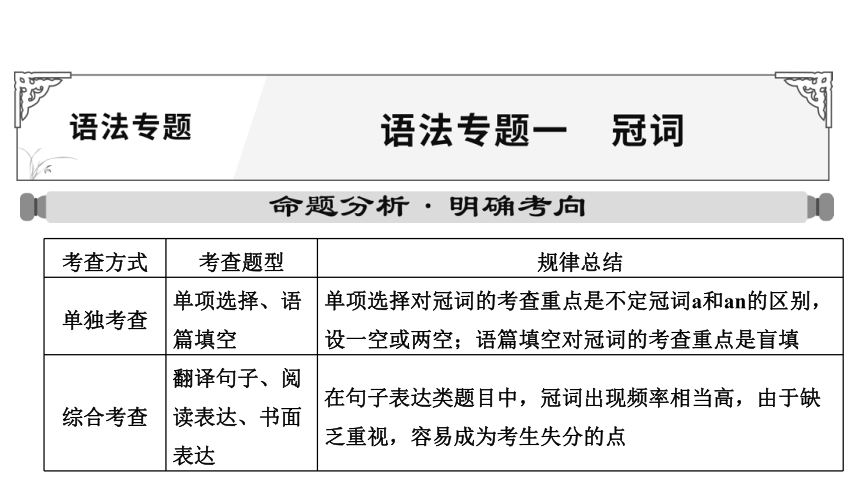 | |
| 格式 | ppt | ||
| 文件大小 | 271.0KB | ||
| 资源类型 | 教案 | ||
| 版本资源 | 人教新目标(Go for it)版 | ||
| 科目 | 英语 | ||
| 更新时间 | 2024-03-20 07:15:52 | ||
图片预览

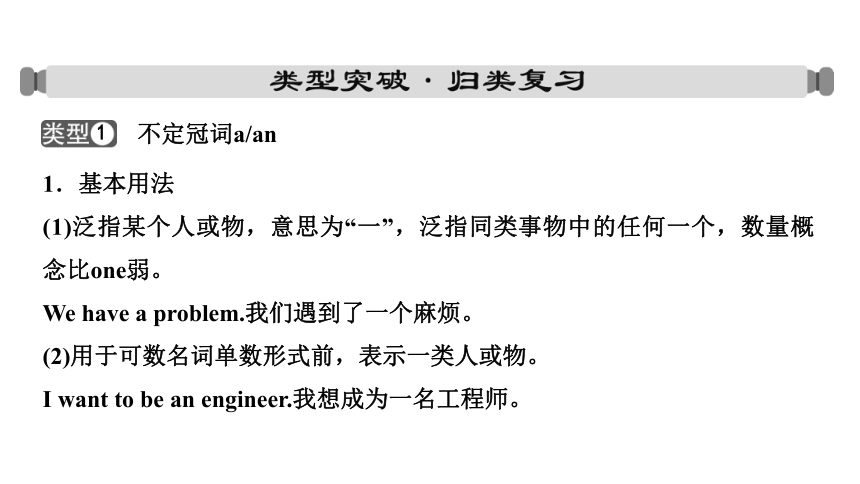
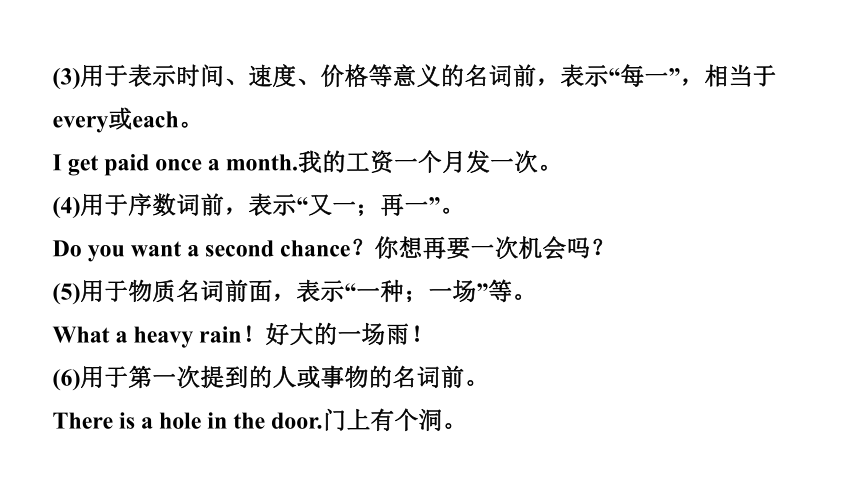
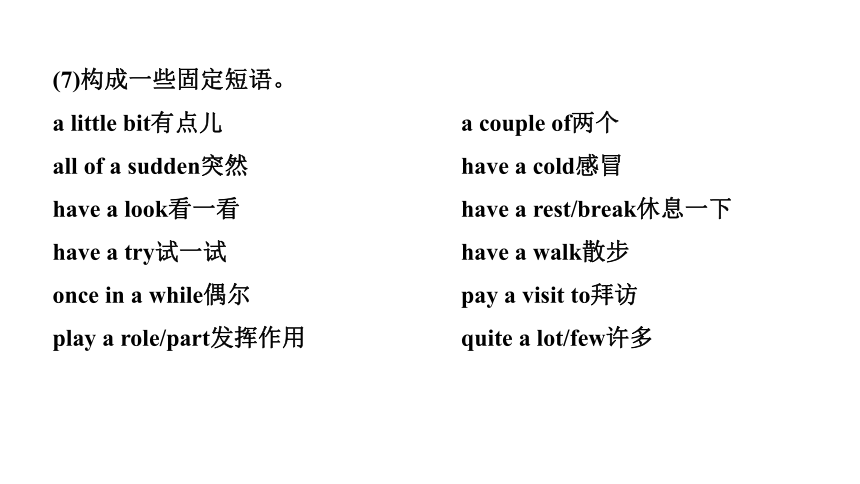
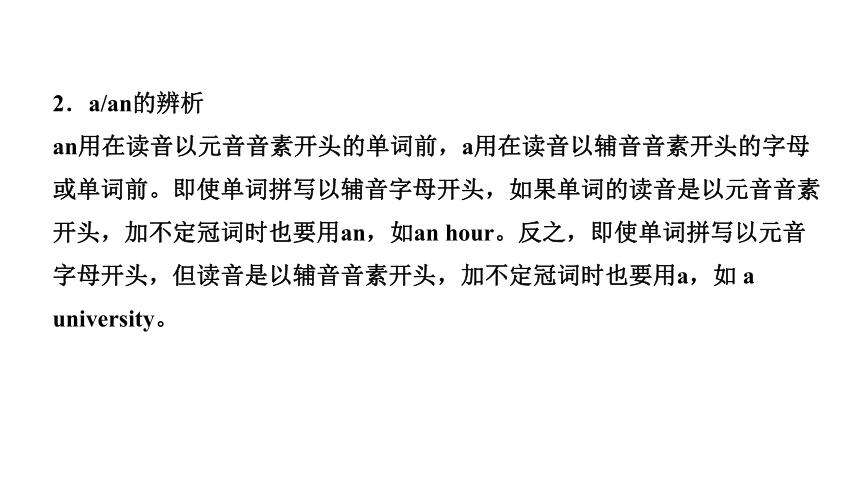
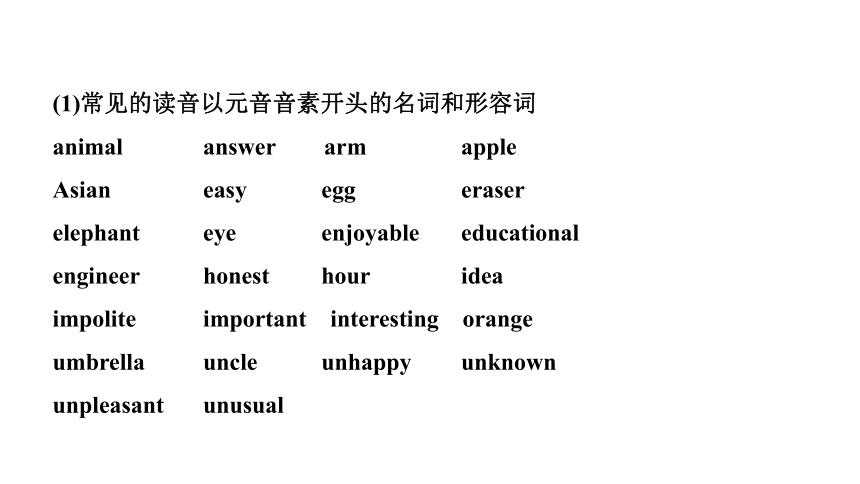
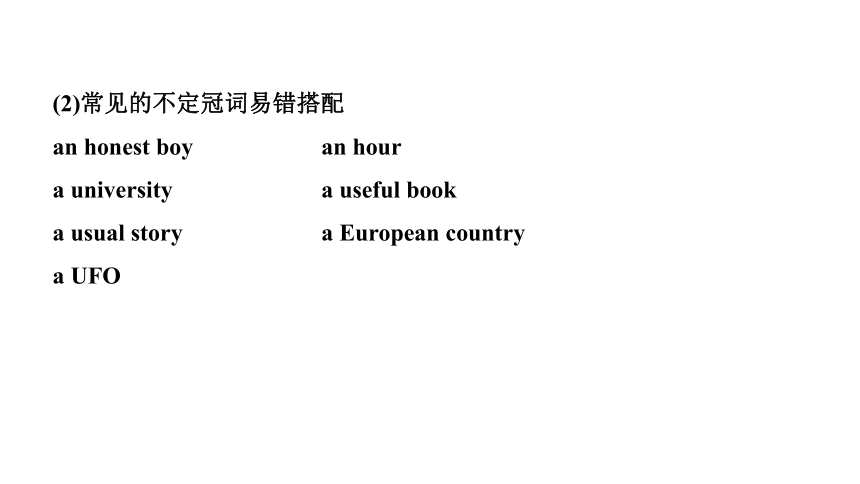

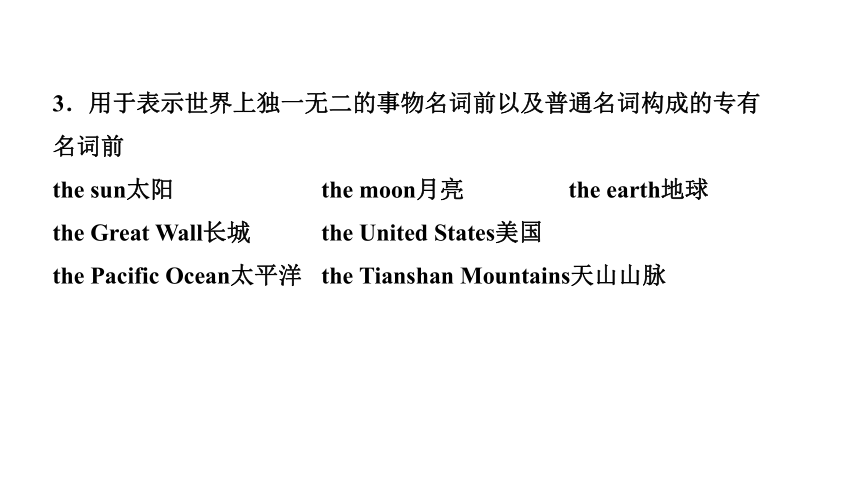
文档简介
(共20张PPT)
考查方式 考查题型 规律总结
单独考查 单项选择、语篇填空 单项选择对冠词的考查重点是不定冠词a和an的区别,设一空或两空;语篇填空对冠词的考查重点是盲填
综合考查 翻译句子、阅读表达、书面表达 在句子表达类题目中,冠词出现频率相当高,由于缺乏重视,容易成为考生失分的点
不定冠词a/an
1.基本用法
(1)泛指某个人或物,意思为“一”,泛指同类事物中的任何一个,数量概念比one弱。
We have a problem.我们遇到了一个麻烦。
(2)用于可数名词单数形式前,表示一类人或物。
I want to be an engineer.我想成为一名工程师。
1
(3)用于表示时间、速度、价格等意义的名词前,表示“每一”,相当于every或each。
I get paid once a month.我的工资一个月发一次。
(4)用于序数词前,表示“又一;再一”。
Do you want a second chance?你想再要一次机会吗?
(5)用于物质名词前面,表示“一种;一场”等。
What a heavy rain!好大的一场雨!
(6)用于第一次提到的人或事物的名词前。
There is a hole in the door.门上有个洞。
(7)构成一些固定短语。
a little bit有点儿 a couple of两个
all of a sudden突然 have a cold感冒
have a look看一看 have a rest/break休息一下
have a try试一试 have a walk散步
once in a while偶尔 pay a visit to拜访
play a role/part发挥作用 quite a lot/few许多
2.a/an的辨析
an用在读音以元音音素开头的单词前,a用在读音以辅音音素开头的字母或单词前。即使单词拼写以辅音字母开头,如果单词的读音是以元音音素开头,加不定冠词时也要用an,如an hour。反之,即使单词拼写以元音字母开头,但读音是以辅音音素开头,加不定冠词时也要用a,如 a university。
(1)常见的读音以元音音素开头的名词和形容词
animal answer arm apple
Asian easy egg eraser
elephant eye enjoyable educational
engineer honest hour idea
impolite important interesting orange
umbrella uncle unhappy unknown
unpleasant unusual
(2)常见的不定冠词易错搭配
an honest boy an hour
a university a useful book
a usual story a European country
a UFO
定冠词the
1.用在特定的表示人或物的名词前,表示特指
Do you know the girl beside the window?你认识窗户旁边的女孩吗?
2.用来指上文中已提到过的人或事物
There is a chair in the room. An old man is sitting on the chair.房间里有一把椅子。一位老人正坐在那把椅子上。
2
3.用于表示世界上独一无二的事物名词前以及普通名词构成的专有
名词前
the sun太阳 the moon月亮 the earth地球
the Great Wall长城 the United States美国
the Pacific Ocean太平洋 the Tianshan Mountains天山山脉
4.用在表示演奏的乐器名词之前
play the violin拉小提琴 play the drums击鼓
5.用于形容词、副词的最高级前
Confucius is known as the greatest thinker all around China.孔子被认为是全中国最伟大的思想家。
6.用在序数词或表示顺序的其他词前
All the students take five subjects in the first year.所有学生第一年要上五门课程。
7.“the+形容词”表示一类人或事物
The new is sure to replace the old.新事物一定会取代旧事物。
8.用在姓氏复数形式前,表示“全家人”或“夫妇俩”
The Turners were having lunch when I got there.我到那里的时候,特纳一家正在吃午饭。
9.用在next, last, same, only等词前
—Are you the only child?你是独生子女吗?
—No. I have a sister.不是。我有一个姐姐。
10.构成一些固定短语
around the world世界各地
do the dishes清洗餐具
go to the movies去看电影
take the subway乘地铁
in the countryside在乡下;在农村
in the face of面对(问题、困难等)
at the top of...在……顶部/顶端
in the end最后
all the time频繁;反复
at the beginning of...在……开始
at the same time同时;一起
by the time...在……以前
by the end of在(某时间点)以前
the day before yesterday前天
the day after tomorrow后天
get in the way of...挡……的路;妨碍
on the one hand... on the other hand...
一方面……另一方面……
the more... the more...
越……越……;愈……愈……
【巧学妙记】定冠词的用法
定冠词用法有规律,防止遗忘很容易。
特指双方都熟悉,上文已经被提及。
世上无二仅独一,序数词和最高级。
山河海岛建筑物,姓氏复数奏乐器。
少数形表人一类,方位名词须牢记。
普构专有惯用词,试用此诀有效率。
零冠词
1.表示泛指的不可数名词和可数名词复数前
We can't live without air.我们离不开空气。
I like oranges, but my mother likes apples.我喜欢橘子,但我妈妈喜欢苹果。
2.名词前已有限定词时
Our task is to help students reach their goals.我们的任务是帮助学生达成目标。
3.表示节日、季节、月份、日期、星期的名词前
March 8th is Women's Day.3月8日是妇女节。
Winter is often cold and snowy.冬天常常又冷又多雪。
3
4.表示球类、棋类、游戏、学科、语言、三餐的名词前
Let's play basketball after school!放学后咱们打篮球吧!
They meet fairly often to play chess.他们经常在一起下国际象棋。
I like physics though it's a bit difficult.尽管物理有点难,我还是喜欢它。
English is one of the most important languages.英语是最重要的语言之一。
What do you like for breakfast?你早餐想吃什么?
5.by后接交通工具时
by bike骑自行车 by car开小汽车
6.构成一些固定短语
on time准时 on foot步行
at noon在中午 at first首先;最初
by mistake错误地;无意中
【易混易错】有些名词前用冠词或不用冠词,意义有所不同。
(1)at table在吃饭
at the table在桌子旁
(2)in class在上课
in the class在班级中
(3)go to school去上学
go to the school到那所学校去
(4)go to bed上床睡觉
go to the bed到床那边去
(5)in front of在……(外部)的前面
in the front of在……(内部)的前部
考查方式 考查题型 规律总结
单独考查 单项选择、语篇填空 单项选择对冠词的考查重点是不定冠词a和an的区别,设一空或两空;语篇填空对冠词的考查重点是盲填
综合考查 翻译句子、阅读表达、书面表达 在句子表达类题目中,冠词出现频率相当高,由于缺乏重视,容易成为考生失分的点
不定冠词a/an
1.基本用法
(1)泛指某个人或物,意思为“一”,泛指同类事物中的任何一个,数量概念比one弱。
We have a problem.我们遇到了一个麻烦。
(2)用于可数名词单数形式前,表示一类人或物。
I want to be an engineer.我想成为一名工程师。
1
(3)用于表示时间、速度、价格等意义的名词前,表示“每一”,相当于every或each。
I get paid once a month.我的工资一个月发一次。
(4)用于序数词前,表示“又一;再一”。
Do you want a second chance?你想再要一次机会吗?
(5)用于物质名词前面,表示“一种;一场”等。
What a heavy rain!好大的一场雨!
(6)用于第一次提到的人或事物的名词前。
There is a hole in the door.门上有个洞。
(7)构成一些固定短语。
a little bit有点儿 a couple of两个
all of a sudden突然 have a cold感冒
have a look看一看 have a rest/break休息一下
have a try试一试 have a walk散步
once in a while偶尔 pay a visit to拜访
play a role/part发挥作用 quite a lot/few许多
2.a/an的辨析
an用在读音以元音音素开头的单词前,a用在读音以辅音音素开头的字母或单词前。即使单词拼写以辅音字母开头,如果单词的读音是以元音音素开头,加不定冠词时也要用an,如an hour。反之,即使单词拼写以元音字母开头,但读音是以辅音音素开头,加不定冠词时也要用a,如 a university。
(1)常见的读音以元音音素开头的名词和形容词
animal answer arm apple
Asian easy egg eraser
elephant eye enjoyable educational
engineer honest hour idea
impolite important interesting orange
umbrella uncle unhappy unknown
unpleasant unusual
(2)常见的不定冠词易错搭配
an honest boy an hour
a university a useful book
a usual story a European country
a UFO
定冠词the
1.用在特定的表示人或物的名词前,表示特指
Do you know the girl beside the window?你认识窗户旁边的女孩吗?
2.用来指上文中已提到过的人或事物
There is a chair in the room. An old man is sitting on the chair.房间里有一把椅子。一位老人正坐在那把椅子上。
2
3.用于表示世界上独一无二的事物名词前以及普通名词构成的专有
名词前
the sun太阳 the moon月亮 the earth地球
the Great Wall长城 the United States美国
the Pacific Ocean太平洋 the Tianshan Mountains天山山脉
4.用在表示演奏的乐器名词之前
play the violin拉小提琴 play the drums击鼓
5.用于形容词、副词的最高级前
Confucius is known as the greatest thinker all around China.孔子被认为是全中国最伟大的思想家。
6.用在序数词或表示顺序的其他词前
All the students take five subjects in the first year.所有学生第一年要上五门课程。
7.“the+形容词”表示一类人或事物
The new is sure to replace the old.新事物一定会取代旧事物。
8.用在姓氏复数形式前,表示“全家人”或“夫妇俩”
The Turners were having lunch when I got there.我到那里的时候,特纳一家正在吃午饭。
9.用在next, last, same, only等词前
—Are you the only child?你是独生子女吗?
—No. I have a sister.不是。我有一个姐姐。
10.构成一些固定短语
around the world世界各地
do the dishes清洗餐具
go to the movies去看电影
take the subway乘地铁
in the countryside在乡下;在农村
in the face of面对(问题、困难等)
at the top of...在……顶部/顶端
in the end最后
all the time频繁;反复
at the beginning of...在……开始
at the same time同时;一起
by the time...在……以前
by the end of在(某时间点)以前
the day before yesterday前天
the day after tomorrow后天
get in the way of...挡……的路;妨碍
on the one hand... on the other hand...
一方面……另一方面……
the more... the more...
越……越……;愈……愈……
【巧学妙记】定冠词的用法
定冠词用法有规律,防止遗忘很容易。
特指双方都熟悉,上文已经被提及。
世上无二仅独一,序数词和最高级。
山河海岛建筑物,姓氏复数奏乐器。
少数形表人一类,方位名词须牢记。
普构专有惯用词,试用此诀有效率。
零冠词
1.表示泛指的不可数名词和可数名词复数前
We can't live without air.我们离不开空气。
I like oranges, but my mother likes apples.我喜欢橘子,但我妈妈喜欢苹果。
2.名词前已有限定词时
Our task is to help students reach their goals.我们的任务是帮助学生达成目标。
3.表示节日、季节、月份、日期、星期的名词前
March 8th is Women's Day.3月8日是妇女节。
Winter is often cold and snowy.冬天常常又冷又多雪。
3
4.表示球类、棋类、游戏、学科、语言、三餐的名词前
Let's play basketball after school!放学后咱们打篮球吧!
They meet fairly often to play chess.他们经常在一起下国际象棋。
I like physics though it's a bit difficult.尽管物理有点难,我还是喜欢它。
English is one of the most important languages.英语是最重要的语言之一。
What do you like for breakfast?你早餐想吃什么?
5.by后接交通工具时
by bike骑自行车 by car开小汽车
6.构成一些固定短语
on time准时 on foot步行
at noon在中午 at first首先;最初
by mistake错误地;无意中
【易混易错】有些名词前用冠词或不用冠词,意义有所不同。
(1)at table在吃饭
at the table在桌子旁
(2)in class在上课
in the class在班级中
(3)go to school去上学
go to the school到那所学校去
(4)go to bed上床睡觉
go to the bed到床那边去
(5)in front of在……(外部)的前面
in the front of在……(内部)的前部
同课章节目录
- 词法
- 名词
- 动词和动词短语
- 动词语态
- 动词时态
- 助动词和情态动词
- 非谓语动词
- 冠词
- 代词
- 数词和量词
- 形容词副词及其比较等级
- 介词和介词短语
- 连词和感叹词
- 构词法
- 相似、相近词比较
- 句法
- 陈述句
- 一般疑问句和否定疑问句
- 特殊疑问句及选择疑问句
- 反意疑问句
- 存在句(There be句型)
- 宾语从句
- 定语从句
- 状语从句
- 主谓一致问题
- 简单句
- 并列句
- 复合句
- 主谓一致
- 主、表语从句
- 名词性从句
- 直接引语和间接引语
- 虚拟语气
- 感叹句
- 强调句
- 倒装句
- 祈使句
- 句子的成分
- 句子的分类
- 题型专区
- 单项选择部分
- 易错题
- 完形填空
- 阅读理解
- 词汇练习
- 听说训练
- 句型转换
- 补全对话
- 短文改错
- 翻译
- 书面表达
- 任务型阅读
- 语法填空
- 其他资料
